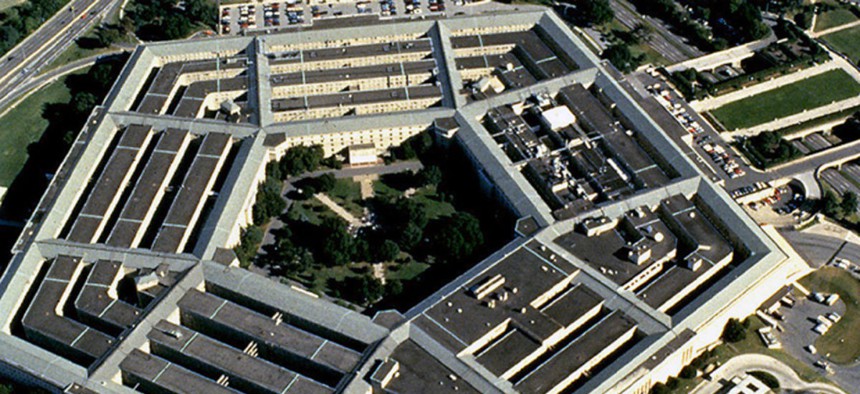
Defense Department file photo
Pentagon Watchdog Officials Now Under Justice Department Probe
General counsel and former acting IG said to have destroyed documents in NSA disclosure case.
Current and former key officials in the Defense Department inspector general’s office are at the center of a Justice Department watchdog investigation instituted on Friday, according to an Office of Special Counsel referral letter obtained by Government Executive.
General Counsel Henry C. Shelley Jr. and former acting Pentagon Inspector General Lynne Halbrooks are alleged by a former colleague to have destroyed evidentiary documents that might have shed light on possible whistleblower retaliation against former National Security Agency official Thomas Drake, who was fired for exposing domestic surveillance activity.
The allegations of civil law violations with roots that go back more than a decade come from a former DoD inspector general office employee who spoke on condition of anonymity, and who is represented by the Government Accountability Project.
“We have concluded that there is a substantial likelihood that the information that you provided to OSC discloses possible violation of laws, rules, or regulations” under U.S. Code Chapter 5, section 1213 (c), said a March 18 letter to the former employee who made the allegations from Karen Gorman, deputy chief of the Office of Special Counsel’s Disclosure Unit. “With your consent, we have identified you as the source of information.”
OSC's letter did not name Shelley or Halbrooks.
Justice Department Inspector General Michael Horowitz’s office will initiate the investigation by June 1 and will report to OSC a year later, the letter said. The final report will be sent to the president and “appropriate congressional oversight committees, and will be maintained by OSC in a public file available on our website.”
Halbrooks, now a partner in Holland & Knight's Washington, D.C., and Northern Virginia offices, did not respond to requests for comment. Shelley remains general counsel at DoD IG, which has been run since Jan. 10 by acting IG Glenn Fine, a longtime Justice Department watchdog.
His spokeswoman Bridget Serchak told Government Executive, "OSC sought the assistance of DoD OIG to decide whether to investigate the allegations itself, with appropriate recusals, or to facilitate investigation by another OIG. The DoD IG welcomed an appropriate, independent investigation of the allegations and contacted DoJ OIG to request such an investigation."
Having the Justice IG do the probe also keeps the case within the jurisdiction of the Senate Judiciary Committee, chaired by longtime whistleblower advocate Sen. Chuck Grassley, R-Iowa. “The examples of poor treatment of whistleblowers by the Defense Department Office of Inspector General that we know about might be just the tip of the iceberg,” Grassley said in a Monday statement. “These are very serious allegations against DoD OIG senior leaders. This kind of behavior isn’t just bad for the whistleblower. It’s also bad for the agency. If whistleblowers can’t get a fair shake, then they won’t make disclosures, and wrongdoing will just continue.”
The Justice Department IG's “practice is not to confirm or deny the existence of investigations,” said John Lavinsky, counsel to the IG.
Halbrooks has been targeted previously by activists in the whistleblower community, once for her role in the investigation of whether top national security officials broke classification rules by revealing the name of the Navy Seal Team 6 leader to Hollywood filmmakers making the movie “Zero Dark Thirty.”
The Drake case, which is a hallmark in the whistleblower community, involved the Justice Department’s prosecution of the NSA senior executive in 2010 under the Espionage Act for speaking about wasteful programs going back a decade to a reporter for the Baltimore Sun. The government eventually dropped the case after public outcry and skepticism from Federal District Judge Richard Bennett.
Tom Devine, legal director for the nonprofit Government Accountability Project, told Government Executive on Tuesday that the administrative investigation prompted by his client “could lead to referrals for further criminal investigation and prosecution.” What’s at stake for the whistleblower community, he said in an email, “is (1) whether they can safely work within institutional checks and balances, or whether they are a trap; and (2) whether they can trust the agencies responsible to protect them when they follow the rules.” If the answer to either is “no,” Devine said, “the only safe alternative is to leak the truth to the public, instead of working through the system.”







